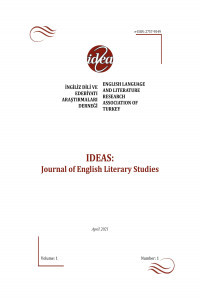Dalkey Arşivi’nde Arşive Dair Şüphe ve Yazarlık Arzusu
Flann O’Brien, Dalkey Arşivi, Yazarlık, Arşiv, Bellek, Alternatif tarihler
Archival Suspicion and Authorial Desire in The Dalkey Archive
Flann O’Brien, The Dalkey Archive, Authorship, Archive, Mnemonics, Alternative histories,
___
- Bloom, Harold. Anxiety of Influence: A Theory of Poetry. Oxford University Press, 1997.
- Booker, M. Keith. Flann O’Brien, Bakhtin and Menippean Satire. Syracuse University Press, 1995.
- Clissmann, Anne. Flann O’Brien: A Critical Introduction to His Writings. Gill and MacMillan, 1975.
- Derrida, Jacques. Archive Fever: A Freudian Impression. Translated by Eric Prenowitz, University of Chicago Press, 1998.
- Duncan, Andy. “Alternate History.” The Cambridge Companion to Science Fiction, edited by Edward James and Farah Mendlesohn, Cambridge University Press, 2006, pp. 209–218.
- Ernst, Wolfgang. “The Archive as Metaphor: From Archival Space to Archival Time.” Open, vol. 7, 2004, pp. 46–53.
- Hopper, Keith. A Portrait of the Artist as a Young Post-modernist. Cork University Press, 1995.
- Joyce, James. Ulysses. Oxford University Press, 2008.
- Long, Maebh. Assembling Flann O’Brien. Bloomsbury, 2014.
- Kearney, Richard. “Narrative and the Ethics of Remembrance.” Questioning Ethics: Contemporary Debates in Philosophy, edited by Kearney and Mark Dooley, Routledge, 1999, pp. 18–32.
- Miller, Nicholas. Modernism, Ireland and the Erotics of Memory. Cambridge University Press, 2002.
- Nolan, Val. “Flann, Fantasy, and Science Fiction: O’Brien’s Surprising Synthesis.” The Review of Contemporary Fiction, vol. 31, no. 3, 2011, pp. 178–90.
- O’Brien, Flann. The Dalkey Archive. Dalkey Archive, 1997.
- ---. At Swim-Two-Birds. Dalkey Archive, 2001.
- The Oxford English Dictionary. Vol. 1., prepared by J. A. Simpson and E. S. C. Winer, Oxford University Press, 1989.
- Said, Edward W. Beginnings: Intention and Method. Columbia University Press, 1985.
- Schwartz, Joan M. “‘Having New Eyes’: Spaces of Archives, Landscapes of Power.” Arcivaria: The Journal of the Association of Canadian Archivists, vol. 61, 2006, pp. 1–25.
- Shapiro, Shelly. “What is Alternate History?” Roads Not Taken: Tales of Alternate History, edited by Gardner Dozois and Stanley Schmidt, The Ballantine Publishing Group, 1998, pp. xi–xiv.
- Stoler, Ann Laura. “Colonial Archives and the Arts of Governance.” Archival Science, vol. 2, 2002, pp. 87–109. doi:10.1007/BF02435632.
- Başlangıç: 2021
- Yayıncı: İngiliz Dili ve Edebiyatı Araştırmaları Derneği / English Language and Literature Research Association of Turkey
Moll Flanders Romanında Anaerkil Alanlar ve Moll'un Kimlik Kazanımında Etkileri
Review of Global Milton and Visual Art
“Dünya çok fazla bizle”: Günümüz Edebî Çalışmalarının Karakteri
Postmodernlik ve Bir Etik İdeal Olarak Otantiklik
Atkinson’ın Suç Romanlarında Jane Eyre’in Feminen Özne Arayışının Tekkerürü
Dalkey Arşivi’nde Arşive Dair Şüphe ve Yazarlık Arzusu
